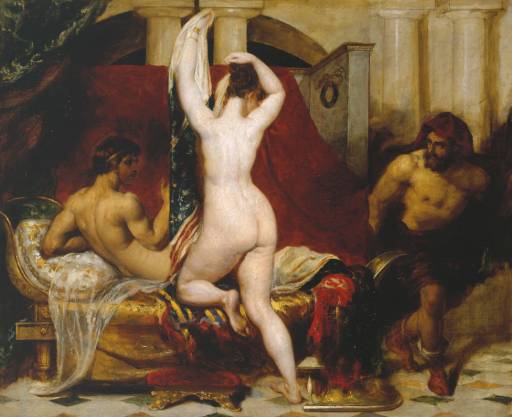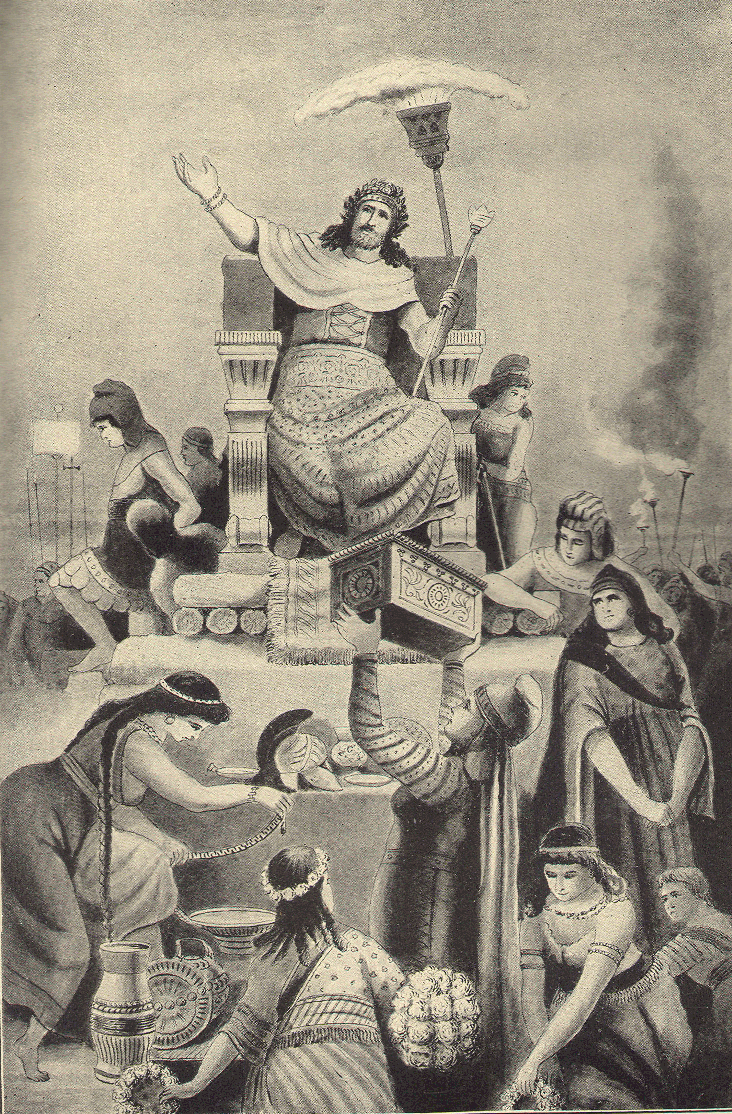
The Histories discussion: Book One

by William Etty 1787-1849
Herodotus of Halicarnassus here presents his research so that human events do not fade with time. May the great and wonderful deeds—some brought forth by the Hellenes, others by the barbarians—not go unsung; as well as the causes that led them to make war on each other.
– 1. Proem (all translations by Andrea L. Purvis)
Thus begins Herodotus inquiries or research into “great and wonderful deeds” by the Greeks and others, leading to the wars between Persia and the Greek city-states. The opening sounds similar to Homer (especially the reference to a-klea or lack of fame going unsung—kleos was a major theme in The Illiad and The Odyssey), but instead of calling a Muse to sing through him Herodotus tells us he will present his research. Herodotus promises to start from the beginning of the conflict between races and he does so over the next few paragraphs, outlining the abductions of Io, Europa, Medea, and Helen of Troy, although these summaries make these legends almost unrecognizable. After the quick summaries of ‘historical’ conflicts, Herodotus abruptly changes gears and informs the reader what his approach will be, zeroing in on one of the major themes of his inquiries:
These are the stories told by the Persians and Phoenicians. I myself have no intention of affirming that these events occurred thus or otherwise. But I do know who was the first man to begin unjust acts against the Hellenes. I shall describe him and then proceed with the rest of my story recounting cities both lesser and greater, since many of those that were great long ago have become inferior, and some that are great in my own time were inferior before. And so, resting on my knowledge that human prosperity never remains constant, I shall make mention of both without discrimination.
– 1.5 [3] and [4]
The first half of The Histories lays the groundwork for the wars between Persia and Greece (490 and 480/79 B.C.), with seemingly endless digressions on his way to culminate in his point that “prosperity never remains constant”. It’s clear I don’t have a classicist’s educational background so I am not going to claim exactly what Herodotus meant in my interpretations, but I hope to relay how enjoyable his history is while helping provide some framework for a first-time reader to enjoy it.
There is a dual nature to The Histories in which Herodotus shows he has benefited from the Ionian enlightenment but continues to be shaped by Homeric epic and Greek tragedy. His reliance on what he has seen and heard, while seeming credulous at times, emphasizes wanting to use his senses and his reason to piece together what has happened. At the same time, some debts to the epic form appear straightforward such as the quote above from 1.5 which echoes part of the opening lines from The Odyssey. In addition, some of the stories he presents as the most likely option he has heard will sound like something straight out of Sophocles.
The first chapter can seem overwhelming on first reading (or at least it did to me on my first time through), but hopefully an overview can assist in seeing the structure of Herodotus’ presentation. During the first book Herodotus shows two rising powers in Asia coming into conflict, Lydia and Persia. Former powers such as Egypt (shown briefly) and Babylon wane, highlighting that changing fortune affects empires as well as individuals. In the meantime, Hellene city-states are growing in power. Sparta, in particular, is called upon to assist in the conflicts against Persia. The first half of Book One revolves around the rise of Croesus and his defeat by Cyrus. The second half of Book One focuses mostly on Cyrus, his rise and ultimate fall.
It is easy to read The Histories cynically and laugh at the impossibilities or exaggerations Herodotus describes. To do so misses out on his allure and charm as well as minimizing the task he sets for himself. Beyond the fictional accounts and folk tales lies a struggle and search for explanations on what has happened in the past and to take lessons from those experiences. Herodotus looks to assign reasons for events tied to personal decisions and actions while not completely ruling out actions from the gods or fate. Herodotus also tries to fit natural events into a methodology which, for the most part, lies outside of Greek mythology. His “history” in Book One lies several generations back so he is at the mercy of what he hears. Maybe less appreciated is his struggle to find a vocabulary and framework to transform that oral history into his written inquiry. Stories he finds most plausible strike us as fanciful but make sense in the context of the myth and tradition surrounding him.
While the conflict between Greece and Persia is the main theme of The Histories, there are several supporting themes that surface in the first Book. Taking some time to look at them should prove useful to a first time reader. As mentioned above, Herodotus presents the theme that “human prosperity never remains constant” very early and the reader will see that this applies to specific men, cities, or empires and even within nature itself. In the first book we see the rise and fall of Croesus and Cyrus, both victims of several other themes within The Histories described below.
One theme revolves around geographic borders and their inviolability. At some point The Histories comes across as a story of failed invasions, many of which occur outside a leader’s home continent. Herodotus explicitly marks the sacred nature of geography in 1.174 when the Cnidians, trying to protect themselves from Cyrus’ army, attempt to turn their peninsula into an island by digging through the strip of land connecting them to the mainland. The oracle responds to their question about the many injuries during this project with “Had Zeus wished it to be an island, he would have made it thus himself.” Ultimately the strength of an empire can lead to its downfall as it tries to expand into areas viewed as exceeding an allowable range. The borders between what Herodotus calls Europe, Asia, and Africa are more than symbols—they represent the boundary beyond which a native people should not expand. Cyrus, in his war against the Massagetae, crosses out of Asia and is defeated. In addition to providing an important theme, some of the most humorous moments in The Histories occur when leaders attempt to tame or punish natural phenomena such as rivers.
One interesting theme (for me) revolves around man’s inability to escape fate. Throughout The Iliad and The Odyssey we see the gods grapple with fate. Zeus knows he could intervene to save his son Sarpedon in battle but heeds the warning of Hera about the precedent he would be setting for the other gods. Poseidon knows he cannot keep Odysseus from returning home but he does his best to make the return as difficult as possible. While the gods never physically appear in The Histories, they make themselves felt through dreams and oracles. Early in the first book we learn that Croesus was fated to fall because of his ancestor Gyges’ offense. Yet Croesus makes his two downfalls, losing his son and his empire, happen in the form of a Greek tragedy through his hamartia, that is his errors in judgment. Croesus misinterprets his dream regarding his son’s death as well as the oracles surrounding war with Persia, limiting his interpretations to what he wants to see or have happen instead of looking deeper into their meaning. The oracle chides him on his multiple misinterpretations but reveals an interesting fact—Apollo deferred or delayed Croesus’ fall “as much as the Fates would concede”, which was three years. “Fated destiny is impossible to avoid even for a god” the oracle acknowledges, which obviously makes for interesting tragedies. Cyrus’ misinterpretation of his dream about a successor does not cause his death, but like most Greek tragedies it does insure that the dream will come true.
A theme sounded throughout the book, yet one that Herodotus doesn’t pull together (at least as I remember) until the closing lines of the book, finds its summary as follows: “[S]oft places tend to produce soft men; for the same land cannot yield both wonderful crops and men who are noble and courageous in war.” (9.121[3]) We see several hints and direct allusions to this theme within Book One. Croesus receives advice from Sandanis regarding the Cappadocians, who he is about to invade, which focuses on what he can take from a people who have little. What power does the victor wield when those defeated had little to start with and will not feel deprived? Sandanis mentions where the Persians stood at this point in comparison to those lacking “luxuries and good things”. (1.71) One of Herodotus’ initial descriptions of Persian customs emphasizes how they differ from the Hellenes, focusing on how the Persians eat and drink more than the Greeks and seem a ‘softer’ people. (1.133) Croesus advises Cyrus, in order to tame the Lydians, to introduce customs that would be viewed as softening them, insuring their submission for the long term. (1.155) Croesus’ final advice to Cyrus involves taking advantage of the Massagetai by providing them with plenty of food and wine, providing luxuries that they would abuse and ‘soften’ their resistance. (1.207) Herodotus makes clear in these asides and in other descriptions that the Persians have become rich and soft because of the available resources.
Book One has many memorable characters and events. Gyges, Croesus, Solon, Cyrus, and Harpagos (just to name a few) will stick with the reader long after The Histories is finished. Those that have read or seen The English Patient will remember the story of Kandaules (the king of Lydia), a man “in love with his own wife” who wanted to prove her beauty to his bodyguard Gyges. Upon seeing Gyges slip out of her room, the queen confronts Kandaules with the shame he has caused and gives him a choice: either kill Kandaules and become the king or be killed. Herodotus drily notes that Gyges decides he would rather survive, providing the curse that would claim Croesus four generations later.
Much of these characters’ history sounds like folk legend, providing Herodotus a vehicle to shape his story and provide the messages he wants to advance. Although Herodotus says he knows of three additional stories surrounding the birth of Cyrus, he refrains from telling them, choosing to relay the one he says seems most plausible. By this point it seems no coincidence that Cyrus’ story sounds like something from myth or a tragedy.
I hope to flesh out some of the points introduced here as I go through the remaining eight books. It will be slow going, but I’m enjoying the book again too much to rush through it.
